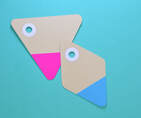|
Many of you probably use Gmail, either for business or privately. Either way, it pays to make life easier for you when you want to find an email. Excel is also a common software to use, so read on for some great tips.  Gmail Tips - Labels You probably use labels in Gmail, which basically act as folders. How to create labels for your emails The easiest way to create a new label is to click on the big + sign on the left-hand side of your screen. This opens the basics for your new label: the name and where to nest it under (your “filing cabinet” structure). When you create names for your folders, be aware that they are sorted alphabetically by Gmail. If you want to sort them differently, an easy way to do this is by naming your folder i.e. 001 Finances, 002 Private, etc. How to colour the labels Once created, you can click on the three overflow dots beside the label to select colours and a lot of other things.  Excel Tips - shortcuts Ctrl + Semi Colon This enters today's date as a value and formats the cell as dd/mm/yyyy. Double-click format painter This will enable you to copy formats to more than one cell Alt + Enter This inserts new lines within a cell. It can be used to make lots of info simpler to read and look less cluttered. Hold down Ctrl and drag the sheet to copy your worksheet Much quicker than right-clicking the sheet name, selecting 'Move or Copy', selecting a position, then ticking the 'Copy' box. Excel tips courtesy of Traci from Excel Ace Limited
If you have any difficulties with those tips, please don’t hesitate to get in touch with me, I’m sure I can help you!
0 Comments
Please avoid the following words and/or phrases:
1. alot Alot (one word) is a common misspelling of a lot (two words). "[W]e all may write alot one day," says The American Heritage Guide to Contemporary Usage (2005), but for now "keep in mind that alot is still considered an error in print." 2. and etc. Because the abbreviation etc. (from the Latin et cetera) means "and so on," and etc. is redundant. In any case, avoid using etc. in your essays: often it gives the impression that you simply can't think of anything else to add to a list. 3. anywheres Huckleberry Finn can get away with saying, "There warn't a sound anywheres," but on formal occasions drop the terminal s. If anywheres appears anywhere in your dictionary, it's probably labeled "nonstandard" or "dialectal." 4. could of (arrrrgh!) Don't confuse this nonstandard form with the contraction could've. Could of (along with should of and would of) can and should be replaced by could have (and should have and would have). 5. hisself This alternative form of the reflexive pronoun himself is commonly heard in certain dialects, but in formal writing steer clear of hisself (and theirself as well—though both were regarded as good usage in Middle and Early-Modern English). 6. furtherest The comparative form of far is farther or further. The superlative form is farthest or furthest. Nothing's gained by combining the two forms. 7. irregardless This double negative (ir- at the beginning and -less at the end) may not deserve Bryan Garner's label of "semiliterate . . . barbarism," but he's probably right that in print it "should have been stamped out long ago" (Garner's Modern American Usage, 2009). Use regardless instead. 8. its' Its is a possessive pronoun (like his or her). It's is a contraction of it is or it has. That leaves nothing for its' to do—so toss it. 9. let's us Let's us means "let us." To avoid repetition, write lets ("She lets us play in her yard"), let's ("Let's play in her yard"), or let us ("Let us pray"). 10. nohow If you have the know-how to write, you don't need to be told to avoid nohow. Instead, use in no way or not at all. So, do you use any of these? Contact me, if you need help with your writing! |
Details
AuthorHi, I am Marion of Marion Metz Solutions Archives
July 2024
Categories
All
|
Find the Terms and Conditions and the Privacy Policy for this website here
 RSS Feed
RSS Feed

